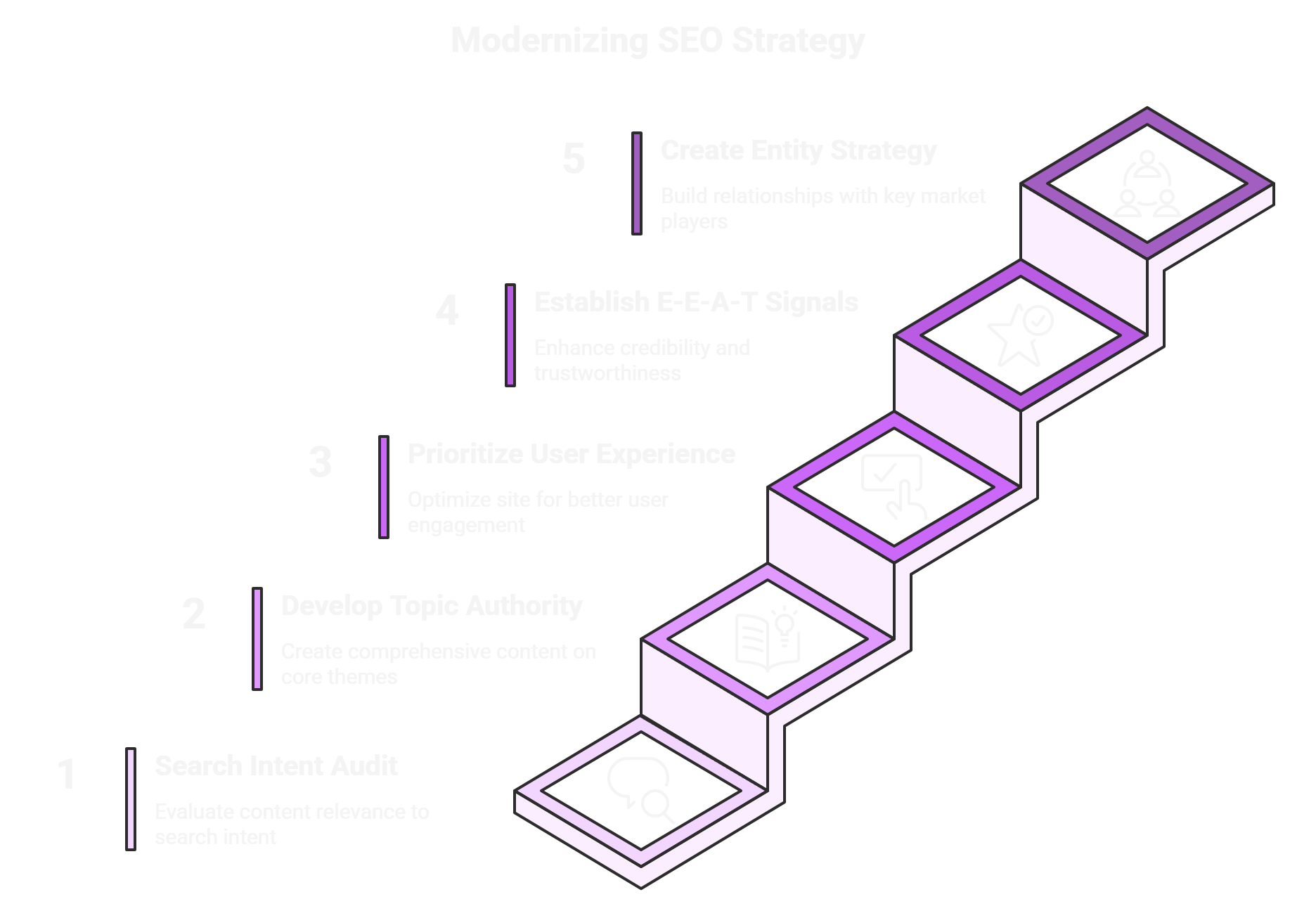SEO in 2025: Adapt or Get Left on Page Two

**Reality check:** If you still work on keyword stuffing and purchasing dodgy links, you would be better off as that person who shows up with a Nokia flip motorized phone to the launch party of iPhone 15. The SEO game has changed, and the SEO checklist backdated to the 1990s is putting big 2010 power.
Everyone is concerned with AI replacing them as a content creator while smart marketers secretly transform the way they do search presence. The truth? SEO is not dead, it has just evolved, becoming much more advanced and elaborate than by putting keywords everywhere, which you are more likely to learn in SEO classes in marketing.
The Evolution of Search: How We Got Here
Can you recall that search engines were more or less matching exact keywords? The times when you could do such things as add five times fifteen with the text that says SEO expert New York in invisible text in the specific part of the bottom of your page and think that it would still work. You are transcribed online at the moment Mr. Google (spoiler alert) will send you howling into page 50 quicker than you can utter the words algorithm update.
The process of search revolution has been occurring in stages:
Phase 1: The Keyword Era
And early search algorithms were rather primitive: Keyword matchmaker of pages with the most instances of exactly those keywords that users (re)quested. Such rudimentary methodology resulted in some downright nutty SEO practices. Keyword stuffing entailed the repetition of search terms to the point where your content sounds like a robot that only suffered a stroke. Hidden text was white letters on white with the text crammed with keywords. Meta tag stuffing was where you would cram all the potential search terms into your meta tags. This aspect of search engines soon came to be known as the creation of a dismal user experience where the most adept keyword stuffers came up top, not the quality content providers.
Phase 2: The Link Revolution
It was a turnaround when Google removed PageRank on the SEO environment. Then suddenly the denomination of the internet became links and each link is a vote of confidence. This changed the SEO game towards link acquisition rather than the density of the keywords. Well, naturally what SEO professionals soon discovered was how to abuse this also. Link farms were websites that existed expressly to make links. The paid links schemes entailed acquiring backlinks rather than earning. Comment spam implied leaving links in comments in blogs all over the web. Every manipulation resulted in updates in the algorithms such as Penguin which penalised these tricks in order to make search algorithms even smarter.

Phase 3: The User Experience Era
With these changes in search engines, they started emphasizing on real user experience signals. Dwell time came into importance as the length of time a person visits on your site after a click on the search results. Ranking by bounce rate began to be a factor in the percentage of visitors viewing one page only and leaving. Click-through rate started to affect its position in terms of the number of people who will click your result when it is displayed. This is how the practices of SEO as a technical manipulation shifted towards the process of real value creation.
Phase 4: The Intent Revolution
The present day search algorithms are currently designed based on the interpretation of the intent of the user and what exactly the person is trying to find by typing a request. This minute and colossal shift implies that word-to-word matching is not so vital as covering the subject in-depth. The content needs to be with the aim of the searcher, which can either be research, shopping, or troubleshooting. Location, search history and the device a person is using are more important than ever.
Phase 5: The AI Revolution
The fact that search experiences are now AI-powered means that we have stepped into a new era in which the search engines have developed the ability to process content almost as humans do. The meaning of the user queries is not merely matched but made out by keywords. Quality of the content and skills are more important than technical tricks of SEO. And this has evolved SEO into a true field of marketing where best content is developed to satisfy searchers who are real people.
Why Your Current SEO Strategy Might Be Embarrassingly Outdated
If your SEO playbook still revolves around exact keyword density and link quantity over quality, you're essentially bringing medieval tactics to a space battle. Here's why many SEO strategies are failing in 2025:
Obsessing Over Keyword Density
The current search algorithm has been applying natural language processing to determine the context of contents. They do not require you to use the term "best running shoes" 7 times in a row; they check the content of your material by terms related to your subject, and the subject in general. Keywords are still important as landmarks, but the ancient tradition of the keyword density mania is long overdue as it is the flip phone. The search engines are no longer interested in frequency of particular terms, but their full coverage.
Ignoring Search Intent
The greatest SEO error that companies commit is to come up with content that matches keywords but not intent. When a user is Googling the problem of the battery in his/her iPhone, the person wants to find some solutions, not an occasion to purchase a new model, but a large number of brands continue to serve sales content in the case of support requests. Knowledge and correlation with search intent is perhaps the one largest aspect about modern SEO. There is a goal of any search query: informational ("how to fix iPhone battery drain"), navigational ("apple support login"), commercial investigation ("best iPhones battery life"), or transactional ("buy iPhone 15 Pro Max"). There is no better way to build content that is spot-on with the purpose of the search query than to write content assuming you actually know what its purpose is.
Overlooking Page Experience
The Page Experience indicators introduced by Google have already made some technical UX factors directly ranking. Pages that do not load fast enough, irritating pop-ups and layouts that change when the page is loading all now have a direct effect upon your search visibility. The traditional SEO involved working on content and links only but the latest SEO involves creation of teams and working together with developers to make sites have magical technical experiences, particularly those on mobile products.
Creating Content for Search Engines, Not People
Probably the most sadistic SEO trick we are still seeing in 2025 is to write robotic content which is keyword enhanced and is only search engine friendly. As AI content detection becomes more effective and user engagement metrics affect ranking more, it is becoming less and less effective to do so. The only thing that search engines are trying to do is deliver the most useful and relevant information according to the needs of the user. Writing to algorithms, instead of people, means you are simply at cross purposes with the very goal of search.
The SEO Strategies Actually Working in 2025

Now that we've covered the outdated approaches, let's talk about what's actually working in today's search landscape:
1. Topic Clusters Over Individual Keywords
Instead of writing separate articles ending up with the focus on individual keywords, effective SEO practices now concern in-depth coverage of the topics at hand. This strategy is producing a definitive, authoritative or pillar page on a general topic, surrounding the pillar page with cluster content, which goes into the subtopics in more descriptive detail, and using internal links to form a semantic relationship between the pages. Developing this kind of structure sends an indication to the search engines that your site has extensive coverage of an issue, becoming the expert and authoritative in your field. Again, as an example, rather than directly targeting "best running shoes," develop a complete ecosystem of content on running footwear, all the way, including pronation, training to run a marathon, and the materials used to make shoes.
2. Entity-Based SEO
The concept of search engines organizing information according to entities (people, places, things, concepts) is becoming more popular than organizing information according to the keywords. Entity-based SEO is to explicitly identify the entities connected with the brand and write about them so as to establish the relationship between the relevant entities and to provide structured data about those relationships so as to be understood by the search engines. The point here is that you can help yourself by thinking in entities and relationships, instead of using keywords because it is the way that modern search algorithms interpret information and structure it.
3. E-E-A-T Optimization
According to Google, Experience, Expertise, Authoritativeness and Trustworthiness (E-E-A-T) are the most critical elements of the content quality. To optimize through E-E-A-T, it is important that the content is written or reviewed by subject experts, offer clarity of authorship credentials, support statements with current authoritative sources, exercise high factual standards, and showcase experience with the subject matter. In this case, the fitness site content on injury recovery would withstand a better ranking when a physical therapist who has the relevant credential writes it compared to the general writer of content.
4. Search Intent Alignment
The best SEO tactics are those that entail careful mapping of content to the search intent. This implies examining the existing pages, which rank higher in the search engines, to determine what purpose Google attaches to each query, researching the type of content, its depth, and orientation of the above-the-line to publish content that meets the established purpose but with the uniqueness of its value. This strategy acknowledges the fact that a lot of work has already been done by search engines in terms of comprehending what the users expect of a certain query.
5. User Experience Optimization
Basic aspects of technical SEO such as site speed are now not all that there is to it as the whole user experience comes into display. All these involve Core Web Vitals optimization (LCP, FID, CLS), mobile-first design and functionality, easy to navigate sites, accessible design to all the users, and distraction-free reading experiences. The mentioned aspects have a direct effect on rankings but also increase conversion, the most unusual win-win in digital marketing.
The Future of Search: Preparing for What's Next
As we navigate the current SEO landscape, several emerging trends point to where search is headed next:
Voice and Visual Search Integration
Voice search is already being used by more than 40 percent of adults every day, and visual search is developing at lightning speed, so at some point, it will be critical to optimize voice and visual search. This involves the development of content that addresses questions that people would ask, the right use of image SEO in terms of useful file names and alt-text, application of structured data to give background to the visual content, and optimization of featured snippets which usually appear as voice results. These types of searching demand the use of something beyond what we would naturally be given to think in terms of text-driven queries, but rather how people really do communicate to one another.
AI-Generated Search Experiences
AI is revolutionizing search engine results protocols, where search engines are getting more into synthesis of information instead of merely connecting to it. That entails optimizing to be used in AI-generated summaries and responses, making your content in a format that simplifies information extraction, paying attention to being the dominant source AI systems will use, and establishing authority so that your content stands as reliable resources to AI systems. Since search engines are increasingly using AI generation, it may prove profitable to be cited as a source rather than get the click.
The Rise of Specialized Search Ecosystems
The old-fashioned Google, which still has an upper hand, is becoming less essential as specialized search economies are rising in value. People have turned Amazon into their product search of choice. Videos are leaders on YouTube. TikTok is the trendsetter in culture and short-form content. The community-based information cannot be done without Reddit. The ranking factors and user behaviors on each platform are different and so should be the SEO effort on those platforms due to the need of customization instead of one-size-fits-all strategies.
Practical Steps to Upgrade Your SEO Strategy

1. Conduct a Search Intent Audit
Check over and evaluate your top priority keywords and determine whether your content is actually relevant to the intent of their searching. Look at the format of the highest ranking results, the questions that they are responding to and the stance they are taking. This will then be corrected through modification of any material that is out of touch with the prevailing wishes.
2. Develop Topic Authority
Instead of chasing after whatever random keyword opportunities are available, consider ensuring that you develop great coverage on what you care about. Find 5–10 core themes that characterize the expertise of your brand. Write pillar articles on each subject, then write cluster articles that discuss subtopics. Take up internal linking, as a strategy, to reinforce topical connections. Such selective strategy creates more effective signs of expertise than unrelated contents that are focused on disjointed keywords.
3. Prioritize User Experience Metrics
Invest in technical optimization with direct effect on the search performance. Put an emphasis on the Core Web Vitals optimization all over your site, correct mobile optimization, any intrusive interstitials or irritating pop-ups, and design of the pages: keep them clean and accessible. Such enhancements not only enhance search performance but also raise conversion rates and engagement.
4. Establish Stronger E-E-A-T Signals
Turn up the credentials and the experience about authors in their bios and make this a credibility signal in your content. Use structured data in the section on the authors of the work, use dates of publication and edits clearly stated, refer to the authoritative sources with the adequate attribution, have the subject matter experts review the content. These improvements are useful to search engines to learn about credibility and trustworthiness of your content.
5. Create an Entity Strategy
Explain the relationships of your brand with significant market players in your business by finding key players involved with products or services. Write something that shows how you relate to these entities (including schema mark-up to identify those relationships), and create backlinks that prove your connections to these entities (authoritative and strong backlinks). It is a strategy that is in line with information processing and classification of contemporary search algorithms.
Final Thoughts: The Evolution Continues
SEO is increasingly becoming a holistic marketing practice involving skills in content management and creation, user experience, carrying out technical implementation, and data analysis. The best approaches to SEO today are those that deal with building exemplary content experiences that actually meet the needs of searchers.
With search becoming more sophisticated, brands that are embracing these changes are getting further and further ahead of those whose strategies are relying on traditions of the past. The great news? Dedicating yourself to the production of truly useful content that is relevant to a user and produces awesome experiences, you make your SEO strategy future-proof regardless of the changes in certain algorithms.
It is also worth bearing in mind that the search engine one has ultimately only a single purpose—connecting the user with the useful and relevant information to his/her search. When the design of your SEO strategy is consistent with this underlying purpose, then, you are building search algorithms, not attempting to game them, which is much more sustainable in 2025 and beyond.
The brands that move to top position in search engines are not the brands with the largest budgets in terms of SEO or the brand targeting the largest number of keywords; it is the brands that most successfully respond to the questions and solve problems that people in the audience are searching.



